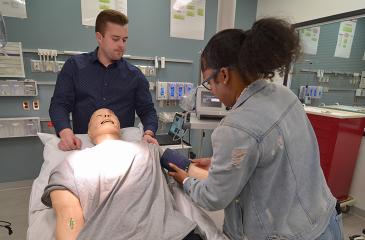Now more than ever, it’s critical that we work together to develop and strengthen the healthcare workforce for Minnesota and beyond. Together, we can turn the challenge of a growing shortage of health professionals into an opportunity to think creatively about sustaining a workforce to meet the health needs of Minnesotans.
Here are just a few of the ways we are expanding our reach through recruitment, training and retention-building:
- The Pre-Health M Simulation Bridge Initiative, a unique collaboration between the Pre-Health Student Resource Center and M Simulation, creates a pipeline for community college students to learn about different healthcare fields and how to apply to programs at the University.
- We continue to work to expand training and placement opportunities in small towns and rural communities. For example, the School of Nursing is working to ensure students in the psychiatric/mental health nurse practitioner program are prepared for rural practice, which includes a requirement to complete a 40-hour clinical experience in a rural community. College of Pharmacy students have a required placement in a rural or medically underserved urban area that includes a specific assignment related to patient care, social determinants of health, community resources, and advancing intercultural understanding. Additionally, a new rural program in Wilmar trains physicians and encourages them to stay and practice in that community.
- The Bridge to Residency for Immigrant International Doctor Graduates (BRIIDGE) program, a nine-month program that aims to help international medical graduates develop the skills necessary to become successful residents in the United States medical system, enables us to tap into existing expertise from around the world.
- Our community offers an enormous resource to our learners. The WILD (Workplace Interprofessional Learning & Development) series is an innovative continuing education offering where participants build interprofessional skills in areas like communication, roles and responsibilities, teams and teamwork, and values and ethics. The initial pilot year has recently finished and the curriculum is being prepared for national dissemination.
We are always looking for new and creative solutions to workforce issues. We’d love to hear from you about any workforce development initiatives you’re a part of.
Driving Innovation & Discovery
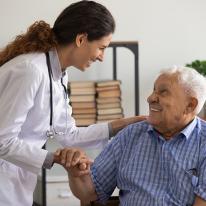
Addressing Ageism in Healthcare
Working with the Minnesota Northstar Geriatric Workforce Enhancement Program (MN-GWEP), Kathleen Krichbaum, PhD, RN, FGSA, ANEF, FAAN, authored MN-GWEP’s recently launched Addressing Ageism in Healthcare toolkit which includes a free online interactive module for health professional students to learn about the definition and description of ageism in today’s world. This toolkit includes perspectives from older adults who have experienced ageism, and from experts who have studied ageism with videos and questions about what people learned from the videos. The toolkit also includes a set of resources and ideas for teaching strategies for teachers and preceptors to use with students in the health professions.
Advancing Interprofessional Education and & Training
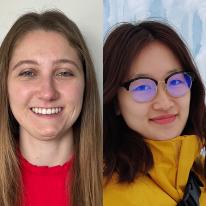
OACA Interprofessional Internship Highlight: Center for Health Interprofessional Programs
Nicole Oblon, MPH, from the School of Public Health, and Chenwei Yan, BA, from the College of Pharmacy, worked with the Center for Health Interprofessional Programs (CHIP) to help solidify the infrastructure for the Health Sciences Care Corners to promote accessibility, quality, and sustainability of their operations. They also worked to gain a better understanding of the food insecurity issues that are currently present among health professional graduate students.
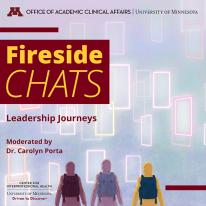
Season 3 of Leadership Journeys Podcast Available Now
These fireside chats bring together University of Minnesota health sciences students with experts for candid conversation on leadership, career pathways, sources of joy, and strategies to rejuvenate. Season 3 explores lifelong learning and growth in serving as a leader; empathy and working through challenges; and more.
Partnering with Communities
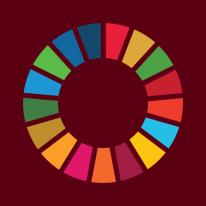
Prototype SDG Data Hub Features Local Data
A group of U of M faculty and students have made significant progress in developing an SDG Data Hub that can be used to track and accelerate the achievement of the Sustainable Development Goals (SDGs). This "hub of hubs" will include data on key indicators for 87 counties throughout the state and will be publicly available. The site is expected to be live in a few months.
U-Wide Events and Opportunities

Reminder: Complete Your Information Security Awareness Training
All members of the health sciences community are required to complete yearly security training. This course is made up of five modules covering common information security awareness topics and takes 30-40 minutes. This security training is different from the HIPAA Privacy training that some users may have been assigned during the first week of May 2023.

June 15: The Role of an End-of-Life Doula with Janet Brown
Learn more about the growing role of an end-of-life Doula, and how it can integrate with hospice and the medical team to support those at the end of their life and their family members to transform the dying process.
